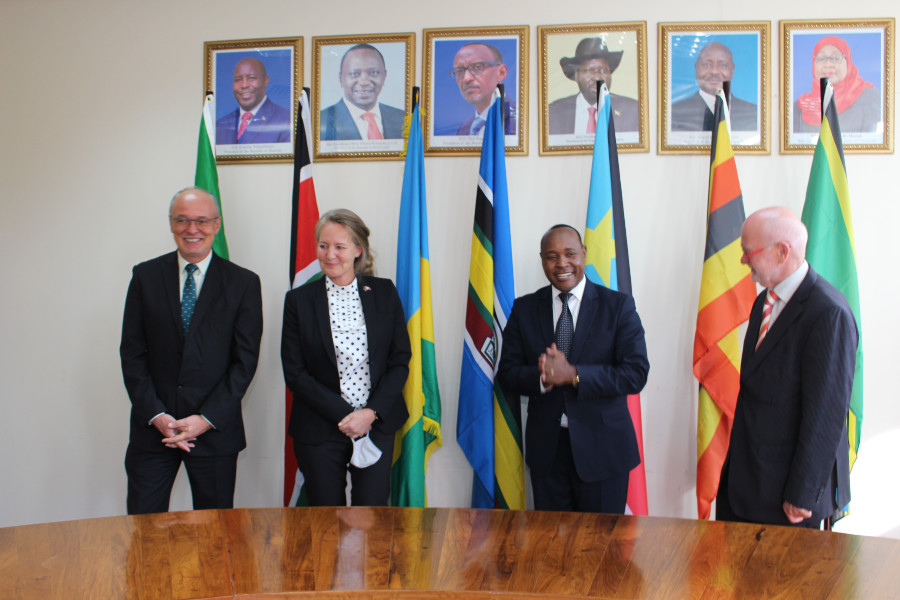
EAC Secretary General receives Belgian, Dutch and Danish Ambassadors
East African Community Headquarters, Arusha, Tanzania, 17th May, 2021: EAC Secretary General Hon. Dr. Peter Mathuki received the Ambassadors of Belgium, Denmark and the Netherlands who paid a courtesy call on him on Monday afternoon.
The three envoys – H.E. Jeroen Verheul (the Netherlands), H.E. Mette Norgaard Dissing-Spandet (Denmark) and H.E. Peter van Acker (Belgium) – hailed Dr. Mathuki following his assumption of office as the EAC Secretary General in April 2021.
The envoys said that they had come to familiarizethemselves with the Secretary General in addition to learning about his priorities for the next five years.
The ambassadors informed the SG that their countries’ experience as members of the European Union was that integration processes everywhere were not a walk in the park but added that efforts must be made as eventually, integration yields immense benefits for the cooperating countries.
They said previously warring countries in Europe had resolved to cooperate jointly to exploit natural resources for their mutual benefit, adding that the EAC could borrow a leaf from this in as far as the exploitation of its vast natural resources were concerned.
Dutch Ambassador H.E. Verheul was categorical that trade and economic integration was not a zero but positive sum game in which all participating countries eventually win, adding that it involves some gains and losses.
Danish envoy H.E. Dissing-Spandet suggested that EAC should ensure that East Africans harvest the low hanging fruit in the integration process immediately to ensure ownership of the process.
In his remarks, Dr. Mathuki assured the envoys that going forward, the aspect of transparency, accountability and good governance would be core in whatever the EAC does and particularly in all its programmes and projects.
Dr. Mathuki told the ambassadors that the EAC would be sending a verification mission to the Democratic Republic of Congo in the month of June as part of efforts to gauge the Central African country’s suitability to join the bloc, adding that this was a directive by 21st Meeting of the Summit of EAC Heads of State held on 27th February, 2021.
Noting that intra-regional trade was the essence of the integration, the Secretary General informed the envoys that increasing intra-regional trade from below 20% to 50% over the next five years would be one of his key priorities.
“We want to create a more friendly environment for doing business to attract investors to the region. We are looking forward to more foreign direct investment coming to East Africa,” said Dr. Mathuki, adding that the participation of the private sector was key as they are the engines of manufacturing and trade.
“I will build on the existing achievements and fill the existing gaps at the EAC. We need to build a Community where each country feels a sense of belonging. I will therefore need your support wherever necessary,” said Dr. Mathuki.
The SG emphasised the need to identify products that could be East African in terms of manufacture with Partner States specialising in the production of various components to ensure ownership of the end products, adding that value chains were critical.
The SG said that the Community needs to get all the four pillars namely, the Customs Union, Common Market, Monetary Union and Political Federation working through implementation.
Dr. Mathuki said that the free movement of services as enshrined in the Common Market Protocol was key to ensuring the best services for citizens across the region.
On the Monetary Union, Dr. Mathuki said that EAC had a lot to learn from the EU to avoid certain pitfalls in putting in place a single currency.
“We are establishing institutions to support the Monetary Union. A common currency will be good for the region as the citizens will be interacting with the Community on a daily basis. It will also ease doing business and reduce the cost of transactions,” he said.
He said that the Political Confederation, which is a transitional stage to the Political Federation would ensure peace and stability which was critical for economic prosperity in the region.
For more information, please contact:
Simon Peter Owaka
Senior Public Relations Officer
Corporate Communications and Public Affairs Department
EAC Secretariat
Arusha, Tanzania
Tel: +255 768 552087
Email: sowaka [at] eachq.org
About the East African Community Secretariat:
The East African Community (EAC) is a regional intergovernmental organisation of six Partner States, comprising Burundi, Kenya, Rwanda, South Sudan, Tanzania and Uganda, with its headquarters in Arusha, Tanzania.
The EAC Secretariat is ISO 9001: 2015 Certified
